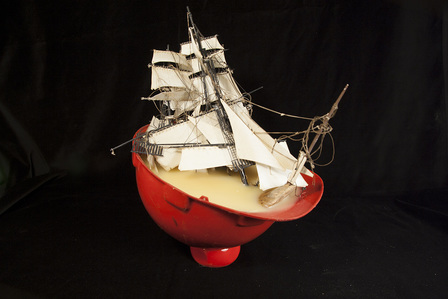an approach to objects
|
obviously there has been a lot written about objects. If one picks up any aspect of objecthood as a focus of research, or enquiry, there will be numerous academic texts exploring a wide range of differentiated facets and related understandings. To quote Fiona Candlin and Raiford Guins (2009, p.2), 'Indeed, our day-to-day, spiritual, emotional, sexual, social, cultural and political lives are conducted in relation to objects and thoroughly mediated by them in whatever forms they take, qualities they possess and complex practices they help enable' . Because objects are so central to every part of our lives it is very easy to become overwhelmed, to feel like one can never know enough, to forget what one has already understood as one moves between fields of knowledge and different academic registers. In practice, one of the best things one can do is to pick something up, feel, its weight, texture and temperature and have a conversation with somebody about it. This way knowledge is located and grounded in experience. The subjective responses of others always extend our understandings - academic knowledge is located, it deepens, differentiates and substantiates our experiences and informs decisions.
|
Our practice deliberately exploits the ubiquitous, slippery nature of objects, we feel that the best examples of what we do comes when we exploit the ambiguity of meanings or 'readings' that exists in common use. We believe that when our interventions increase this ambiguity and push objects from the relatively 'known' towards the 'unknown', the slipperiness increases. This kind of mobility 'defamiliarises' us, using Viktor Shklovsky's term we are forced to resist 'automated perception' and the experience of the object is 'made strange'. When we don't 'know', when we can't habitually respond, we either start to question or we defend ourselves. The propensity of an individual to explore, enquire, scrutinise, probe, or evaluate an 'unknown' or 'lesser-known' object, as opposed to resisting, refusing, or negating it, depends to a large degree upon a tolerance for 'not knowing'.
Harrison, C. & Wood, P. (1992) Art in Theory 1900-2000, An Anthology of Changing Ideas. Blackwell Publishing: Malden, Oxford & Victoria. Ch. III, p.277
Candlin, F. & Guins, R. (2009) The Object Reader. Routledge: Oxon & New York
Harrison, C. & Wood, P. (1992) Art in Theory 1900-2000, An Anthology of Changing Ideas. Blackwell Publishing: Malden, Oxford & Victoria. Ch. III, p.277
Candlin, F. & Guins, R. (2009) The Object Reader. Routledge: Oxon & New York

